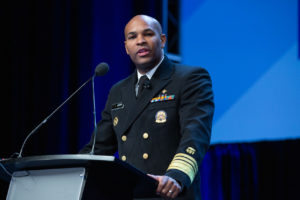U.S. Surgeon General Jerome Adams, M.D., M.P.H., is calling on anesthesiologists to improve the health in their communities by championing their roles as physicians over that of proceduralists.

U.S. Surgeon General Jerome Adams, M.D., M.P.H.
Dr. Adams, the first anesthesiologist Surgeon General, delivered the Emery A. Rovenstine Memorial Lecture on Monday in front of a full auditorium where he described America’s biggest health care concerns, inequalities in health care and how anesthesiologists can make a difference.
For the third year in a row, life expectancy in the United States has decreased. It’s now officially a trend, he said.
“We are the first generation in half a century who can’t look our kids in the eye and say, ‘You are going to live longer.’ We have work to do,” Dr. Adams said.
Obesity, diabetes, opioids, e-cigarettes, marijuana, climate change – the list that competes for Dr. Adams’ attention is long. The hardest part of his day: “Meeting with people who want to make their top priority my top priority,” he said.
Instead, Dr. Adams is determined to address America’s health care issues by encouraging people to do more to improve their health starting in their very own communities. His motto as the “Nation’s Doctor” is “better health through better partnerships.”
In response to the opioid epidemic, Dr. Adams issued the first Surgeon General’s Advisory in 13 years, urging more Americans to carry naloxone, an FDA-approved medication that can reverse the effects of an opioid overdose.
“You are more likely to be called upon to use naloxone than to perform CPR,” he said.
He issued the second Surgeon General’s Advisory on the dangers of vaping, in response to the meteoric rise of e-cigarette use in America. Currently, one in five youths are using e-cigarettes, Dr. Adams said. And a third of youth who have vaped have vaped marijuana, he added.
“I’m extremely concerned about the normalization of marijuana in America today,” Dr. Adams said, explaining that today’s marijuana is three to five times more potent in levels of THC than it was 25 years ago. “It was like drinking a can of beer 25 years ago, and it’s like drinking a pint of vodka today.”
How can anesthesiologists help Dr. Adams’ mission? By seeing themselves as more than proceduralists – by seeing themselves as physicians. Anesthesiologists should use their position to talk to patients about better health. Ask them if they vape or if they’ve talked to their children about the dangers of vaping. Direct them to smoking cessation resources. He also asked anesthesiologists to check their biases at the door, reminding them not to judge patients too harshly for the decisions they have made.
“Putting more care in your health care requires that you recognize the inequities that patients face and the reasons you judge them,” Dr. Adams said.
As someone who grew up “government cheese” poor, the son of two teachers, Dr. Adams said he knew what it meant to sacrifice and do without. With few resources, he knew that if he wanted something, he had to work for it, even if it meant getting a job when he was 10 years old working in a tobacco field.
“I worked in the south Maryland tobacco fields,” he said, while displaying a larger-than-life Surgeon General’s Warning from a pack of cigarettes on the screen behind him. “The irony is not lost on me.”
He said that even at the time, he knew how unhealthy it was for him to work there, but like many Americans, he didn’t have the luxury of setting that aside. He needed the income.
“We make decisions every day that can compromise our long- and short-term health,” Dr. Adams said. “Many times, it’s for the sake of our financial well-being. Think of that the next time you judge why others do things. We all do what we must to pay the bills.”
Dr. Adams said he empathizes with the frustrations of doctors who treat patients and send them back to their same lives and circumstances, only to see them again for the same ailment.
“I’m convinced our failure to change this trajectory has more to do with burnout than any other thing. And no amount of yoga or tai chi is going to change that,” he said.
He encouraged anesthesiologists to look for missed opportunities to step up and speak out. Mentor someone. Support a diversity group. Support research.
“Your voice really does matter, but it only matters if you use it,” he said. “If you do just one of these things, we’ll start to change the world for the better.”
Just before his lecture, Dr. Adams was presented with a Fellow of the ASA (FASA) certification and pin by 2019 ASA President Linda J. Mason, M.D., FASA.
Other award recipients were also recognized before the lecture, including:
- Judith Hellman, M.D., ASA Award for Excellence in Research
- Oluwaseun Johnson-Akeju, M.D., M.Sc., James E. Cottrell, M.D., Presidential Scholar Award
- Jerome Klafta, M.D., ASA Excellence in Education Award
- Elizabeth Frost, M.D., Nicholas M. Greene Award
- Mark A. Warner, M.D., Distinguished Service Award
Around 50 recipients were also recognized with the new ASA-SEA Distinguished Educator in Anesthesiology Award.
Return to Archive Index